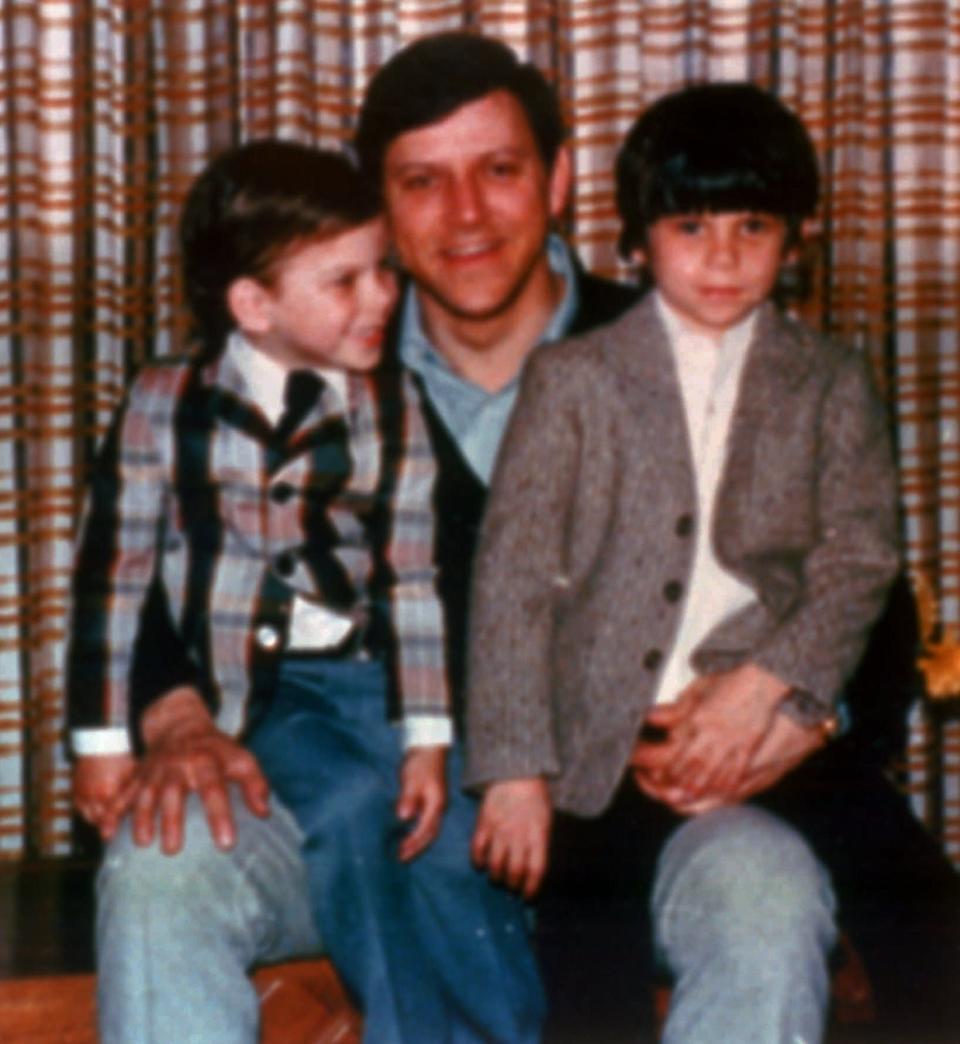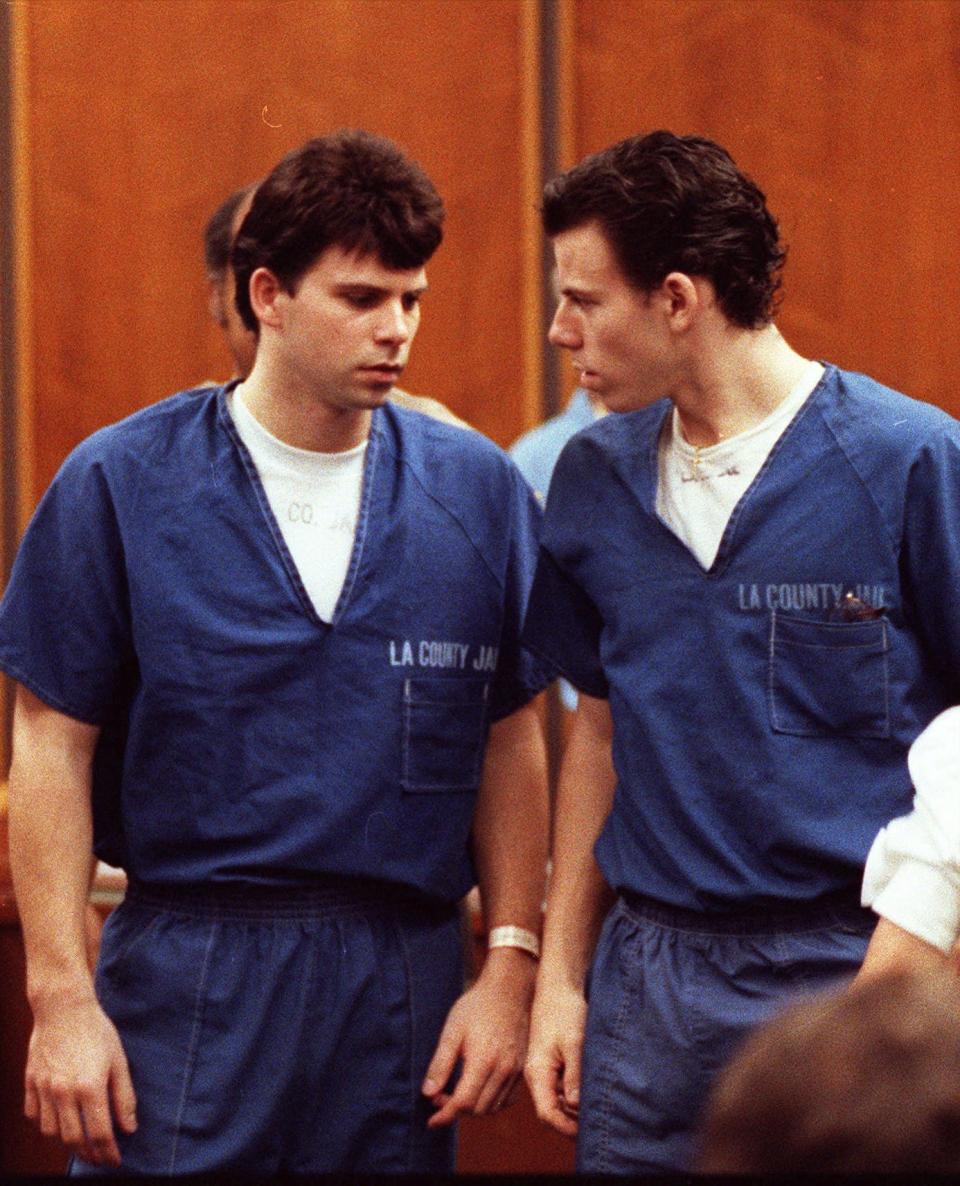Can new Menendez docuseries change your mind about the brothers? Dad Jose 'was a monster'
- Oops!Something went wrong.Please try again later.
August marks 34 years since two privileged young men took the lives of their parents with shotguns in the Beverly Hills mansion they called home. Lyle Menendez, then 21, and his brother Erik Menendez, then 18, fired at Jose and Mary Louise “Kitty” Menendez several times, including at point-blank range to the head.
Prosecutors asserted the brothers wanted their parents’ $14 million fortune. But a new Peacock docuseries, “Menendez + Menudo: Boys Betrayed” (now streaming), explores a defense written off by prosecutors as an “abuse excuse.”
The docuseries is executive produced by journalist Robert Rand, author of "The Menendez Murders," and his fellow reporter Nery Ynclan, who are featured, along with Lyle's former appellate attorney Cliff Gardner. The Menendez brothers are interviewed by phone from prison.
Lyle and Erik claimed their father, a former executive at RCA Records, abused them physically, sexually and emotionally since they were young. Roy Rosselló, a member of the Puerto Rican boy band Menudo in the 1980s, alleges in the three-part doc that José drugged and raped him when he was a teenager. This allegation may help Lyle and Erik petition to overturn their murder conviction, and therefore the life-without-parole prison sentences each is currently serving in San Diego, in exchange for lesser charges.
More: Former Menudo member alleges Menendez brothers' father raped him
The Menendez brothers’ trials: ‘Limit the so-called abuse excuse’
Initially, Lyle and Erik were tried separately in proceedings that began in 1993. On the stand, Erik fought back tears as he told jurors of his dad's abuse, which he said began when he was 6 and lasted until the time of the murders.
“I wanted it to stop,” he said breaking down. Deadlocked juries resulted in mistrials for the brothers, who were retried together when evidence of sexual abuse was ruled inadmissible.
David Conn, a prosecutor for the second proceeding, says in the documentary, “One thing that we have asked the judge to do is to limit the so-called abuse excuse, to limit evidence that has nothing to do with this case.”
Attorney Cliff Gardner, who represented Lyle in the '90s to aid in his appeal, says in the documentary that restriction “made it worse, because the defense evidence that was presented was so trivial. So we don’t hear that Lyle, when he was 8 years old, told (his cousin) that his father was touching his penis. We don’t hear that Lyle, when he was 12 or 13, wrote an essay about a father put on death row for molesting his child.”
Gardner says the brothers shouldn’t have been convicted of murder, but instead two counts of manslaughter (each offense punishable by a maximum of 11 years in California). If they had, the brothers would be free by now.
Why believe convicted liar Casey Anthony? Documentary director addresses 'understandable' outrage

Why did the Menendez brothers kill their parents?
In a call from prison, Erik says that he kept quiet about the abuse because he feared for his life and the life of anyone he might've told. “My father made it clear to me that if I ever told anyone at that point, that he would kill me,” Erik says.
So why didn’t the brothers, who were then adults, flee the Beverly Hill estate and the alleged abuse? Gardner says years of abuse clouded their reasoning. “You don’t think that way because you’ve been abused since you were 5.”
Kitty knew about the abuse, Erik says in the docuseries, yet did nothing.
“I felt that if my mom knew, that she would have to save me," says Erik. "But I felt that if I told her that her life would be in danger. And so when my mother told me that she knew, that she had always known, it was devastating to me. I never recovered from that moment.”
Roy Rosselló’s claims against Edgardo Diaz and Jose Menendez
Rosselló says Menudo’s manager, Edgardo Diaz, recruited him to join the group when he was 13. The Menudo member from 1983-86 says Diaz told him that if he wanted to be famous, there were certain things he’d need to do.
“He would rape me three or four times a week,” Rosselló claims. Diaz was accused of mental and sexual abuse in HBO Max’s “Menudo: Forever Young” docuseries released lastJune. Diaz did not respond to interview requests for "Menendez + Menudo." He has denied the allegations.
Rosselló says Diaz introduced him to Jose Menendez in New York. “When I got in the limousine, I see Menendez looking at me, as if he wanted to devour me,” Rosselló says. He later adds, "Jose Menendez was a monster."
At Jose’s house, Jose Menendez gave the teen a glass of wine and told him to drink all of it. Rosselló suspects the drink was drugged.” He says he was taken to a room. “I couldn’t react, because I had no control over my body,” he says. “After that, I woke up in the hotel” with no recollection of how he got there.
“I was in terrible pain for a week,” he recalls with tears in his eyes. “I could barely stand the pain.”
The 10 must-see movies of summer, from 'The Flash' and 'Little Mermaid' to 'Indiana Jones'

Where do the Menendez brothers go from here?
When Erik is informed about Rosselló's allegation, he says it makes him feel terrible and that he suspects there weremore victims.
"For so long people just refused to believe it," he says. "But I never wished for it to come out like this, the result of trauma that another child has suffered.”
Although Gardner says he no longer represents Lyle or Erik, in an email to USA TODAY he offers hope the brothers will file a state petition presenting new evidence. “It’s certainly the basis for a habeas filing,” Gardner says in the docuseries.
Lyle says in the series the revelation is “very validating for me on a personal level,” but he's "discouraged" with the judicial system. “I live my life working with other victims of abuse in here, of which there’s a huge number," he says. "I try to find purpose in what happened to me and the suffering that I went through, that my brother went through. But I don’t look too far beyond the prison walls with it.”
This article originally appeared on USA TODAY: Erik and Lyle Menendez doc: Can it change your mind on the murders?

